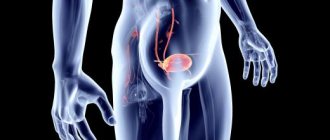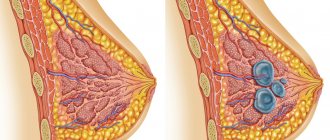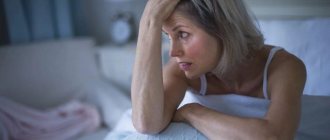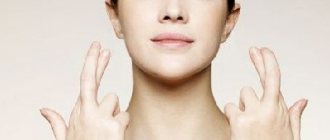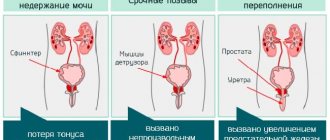Prolapse of the walls of the pelvic organs in women can be observed even after normal childbirth, which is explained by muscle strain or damage to the tissue of the perineum. Moreover, according to WHO, only 29% of women with these problems seek medical help, and in Russia the situation is even less favorable - in 10% of cases. People often do not know the existence of modern minimally invasive treatment methods and prefer to ignore such conditions. You need to be more careful about your health. There is a solution to the problem, doctors know how to deal with these problems.
The essence of the disorder
First you need to understand the terms and determine the scale of the problem. Uncontrolled urine output manifests itself as:
- Incontinence itself (incontinence) is often a pathological process caused by a number of causes and diseases, expressed in the incompetence of the urethral sphincters and the detrusor muscle of the bladder, resulting in involuntary urination. This condition can also be observed when sneezing, jumping, or severe coughing.
- Leakage of a few drops of urine after urination is more common in men, but also happens in women, due to physiological changes.
- Enuresis is a disease predominantly of childhood, caused by neurogenic and psychogenic factors, characterized by spontaneous emptying of the bladder at night.
In any case, regardless of the form and severity of the manifestations, in case of such disorders you should consult a urologist.
Treatment Options
Depending on the causes of the problem and the severity of the patient’s condition, treatment methods vary:
- Drug treatment. For bacterial infections, antibiotics are prescribed. Stressful urine production involves taking antidepressants. When the walls and sphincter of the bladder are weakened, the use of drugs that increase muscle tone is indicated.
- Surgical intervention. Necessary for oncology and changes in the structure of the urinary system. Patients have the tumor removed, implants installed, a special gel injected, or laser treatment of the urethra performed.
- Physiotherapy. Aimed at increasing blood flow to the pelvic organs and improving muscle elasticity. For such manipulations, microcurrents, heating or electromagnetic pulses are used.
If after urination a woman produces drops of urine, she should immediately contact a gynecologist, neurologist or urologist. The doctor will help you avoid the need to constantly use pads or diapers and promptly identify the diseases that led to the problem.
Causes of problems in women
We are talking about urine leakage, and not about completely uncontrolled diuresis. It should be noted that genitourinary diseases and injuries often lead to a similar condition. Most often, the release of urine drop by drop is observed during cystitis and other inflammatory processes. The causes of minor urine leakage in women are often associated with a number of natural physiological conditions of the body. For example, in teenage girls this is due to hormonal changes. In older girls, a few drops of urine may be released during orgasm.
Impact of pregnancy and childbirth
When carrying a fetus, due to pressure on the bladder by the uterus, especially in the later stages, the pregnant woman experiences a frequent urge to urinate. It happens that urine leaks a little due to impaired blood circulation in the pelvis and relaxation of the sphincter function. In addition, urine leakage during pregnancy can be caused by sudden hormonal changes, as a result of which the pelvic floor muscles become more elastic and easier to stretch. During this period, it is important to distinguish genitourinary pathology from leakage of amniotic fluid; at the end of the last trimester, you should definitely consult with an obstetrician-gynecologist. Sometimes women experience slight leakage of urine after childbirth, especially if it was difficult and lasted long enough. Incontinence of varying severity can also appear after ruptures, trauma to the birth canal and prolonged catheterization.
Age-related changes
After about 50 years, changes occur in a woman’s body due to the decline of reproductive function. Menopause is often accompanied by the development of various pathological processes. It's all about hormones, or more precisely, the main female hormone - estrogen. After a certain point, its production begins to decline, which entails a number of unpleasant consequences for the body.
Lack of estrogen affects the entire endocrine system:
- blood pressure jumps,
- immunity suffers
- various inflammatory processes appear more often,
- kidney stones form
- the functioning of the sphincters may be impaired,
- the pelvic floor muscles begin to lose their elasticity.
Taking certain medications, such as diuretics, can also cause leakage. It is at this age that women note the need to use special panty liners, but many are embarrassed to contact a specialist. It is important to correctly assess the appearance of unpleasant symptoms and differentiate physiological changes from pathological ones, and not try to independently treat an unknown disease at home.
Forms of urinary incontinence
- Stress form - urine leaks out involuntarily during slight stress (laughing, sneezing, coughing, lifting heavy objects, etc.). Basically, the woman does not feel the urge to urinate. Sudden increases in intraperitoneal pressure can serve as a stimulating factor for weakened muscular elements of the pelvic floor and urethra, thereby provoking the leakage of urine. Experts also associate muscle weakening and pelvic organ prolapse with the amount of collagen content observed in menopausal women.
- Urgent form - involuntary urination occurs after a strong urge (overactive bladder syndrome). Typically, a woman cannot control the spontaneous leakage of urine and often does not make it to the toilet. Urge incontinence can be provoked by external factors (washing hands, washing dishes, the sound of water, cold season, nervous excitement, etc.).
- Mixed form - characterized by a strong urge to urinate combined with slight tension (change in body position, sneezing, coughing or laughing).
- Enuresis is a form characterized by involuntary release of urine at any time of the day. When bedwetting is noted in women, we are talking about nocturnal enuresis.
- Permanent incontinence is associated with pathology of the urinary tract, abnormal structure of the ureter, sphincter failure, etc.
- Dripping - immediately after urination, a slight dripping of urine occurs, which remains and accumulates in the urethra.
The most common are stress and urgency urinary incontinence; all other forms are rare.
Classification of stress urinary incontinence
- 0 – increased urethral mobility without documented evidence of incontinence;
- I - increased urethral mobility with documentary confirmation during physical examination;
- II – similar to type I with the formation of a cystocele;
- IIa – cystocele in the vagina;
- IIb – cystocele outside the vagina;
- III - internal urethral insufficiency (proximal sphincter), severe urinary incontinence.
Male causes of the disorder
There are also many reasons why men leak urine in drops after urination. A significant role in this process is played by the structural features of the male genitourinary system, namely the longer urethral canal. Often this is an exclusively physiological problem, which can be eliminated by simply waiting for the process to complete. If a man does not have any diseases due to which urine can drip in microportions, such leakage is called dribbling. This problem affects approximately 1/5 of the entire male population. The reason is weakness of the bulbocavernosus muscle, located at the base of the penis. Dribbling can occur at any age.
Older men often constantly get up at night to urinate, but even going to the toilet at night does not bring the expected relief. This is the first sign of prostate problems. In the case of surgical treatment of prostate pathologies, leakage may be due to psychological factors. In the early postoperative period, patients are often afraid to strain their muscles once again, which is why the bladder does not empty completely. In addition, pain may be felt for some time after the operation, which also serves as a stress factor. In such cases, episodes of the appearance of a few drops of urine after urination are transient in nature and not permanent; drug correction is not required. In some situations, a urologist may recommend herbal remedies or drugs with a mild sedative effect. If such a problem persists and is observed in the late postoperative period, you should definitely notify your doctor about it. Perhaps correcting the patient’s conditions and lifestyle will help cope with the inconvenience without taking pills.
Diagnostics
When you first visit a medical facility, the doctor will carefully question you about the manifestations of the disease and ask you to fill out several questionnaires. They may look different, for example like this.
Have you noticed the following symptoms? If yes, how often (never - 0; rarely - 1; average number of times - 2; often - 3):
- frequent urination;
- urinary incontinence, accompanied by an unbearable urge;
- urinary incontinence after physical activity, coughing, sneezing;
- loss of a small amount (a few drops) of urine;
- difficulty urinating;
- pain or discomfort in the lower abdomen/genital area.
Although the number and nature of questions may vary, they are all aimed at subjective assessment of the disease. Therefore, we must try to answer the questions as accurately as possible. At the same time, you should be guided by the state of your body only for the last month - no need to remember what happened a month or two ago.
To make a correct diagnosis and choose adequate therapy, it is necessary to find out the problems that are bothering you at the present time.
The doctor will also ask you to fill out a urination “diary,” which allows you to give a more objective assessment of the patient’s symptoms. When filling out the diary, the amount of fluid drunk, the frequency and volume of urination, the presence of imperative (unbearable) urges and episodes of urinary incontinence are taken into account. The voiding diary cannot be assessed without the patient. Thus, after filling out the diary for 24-48 hours, you will again come to see the doctor, who will pay attention to the frequency of urination, its volume and how you yourself describe the act of urination. The voiding diary records the following factors for every 2 hours:
- what liquid did you take and in what quantity;
- how many times have you urinated;
- how much urine was released (a little, medium, a lot);
- have you experienced an unbearable urge to urinate?
- what were you doing at that moment;
- whether you have had an episode of involuntary urinary leakage;
- how much urine was passed during the episode;
- What were you doing during the involuntary loss of urine?
It is recommended to keep records for the next 3 days. To obtain the most accurate and reliable results, it is recommended to keep the diary with you at all times.
After the conversation and filling out the questionnaires, the doctor will conduct an examination in a gynecological chair and a cystoscopy. Your chairside exam will be similar to the exams you receive during a regularly scheduled visit to your gynecologist. This will include a routine vaginal examination to rule out diseases of the uterus and vagina that may also cause SUI. In addition, the doctor will conduct several specific tests (tests) that will most likely diagnose SUI. The main one is the so-called “cough” test, in which the doctor will ask you to cough. The test is positive if urine is released from the external opening of the urethra when coughing. It is important to note that even a small amount of urine excreted in this way allows a diagnosis of SUI to be made.
Cystoscopy is an examination of the bladder, in which a special device (cystoscope) is inserted into its cavity through the urethra, with which the bladder is examined. It is important to note that cystoscopy is a mandatory examination method, regardless of the results of specific tests. Cystoscopy allows you to identify bladder diseases such as cystitis (inflammation of the bladder mucosa), diverticulosis (protrusions of the bladder wall, such as hernial sacs), etc., which can complicate SUI.
These two studies can be carried out both on an outpatient basis and in a hospital, however, if the diagnosis is difficult and if it is necessary to clarify treatment tactics, it is necessary to conduct additional studies in a hospital setting. Such studies include:
- laboratory tests (urinalysis, blood analysis, urine culture);
- Ultrasound of the kidneys and bladder (determination of residual urine);
- complex urodynamic study (uroflowmetry, cystometry and profilometry, during which the act of urination is reproduced under artificial conditions with sensors located inside the bladder and rectum for constant monitoring of changes in pressure indicators).
This study is invasive; infectious complications may develop, so it is preferable to perform it in a hospital.
Advertising
Causes of pathology in children
Urine leakage in children under 2–2.5 years old is considered normal. But if a child over 3.5 years old constantly wets his pants, a consultation with a urologist is required. The causes of urine leakage in children may be developmental anomalies or congenital pathologies of the genital organs and urinary system, as well as physical and psychological trauma. Children react to stressful situations in their own way, and one of the manifestations of this reaction may be varying degrees of urinary incontinence. Uncontrolled leakage is often observed in hyperactive children and does not pose a big problem. In any case, you should not joke with your child’s health and you should definitely consult a doctor.
Causes of involuntary urine leakage
Urine leakage is the involuntary release of small amounts of urine after urination. For any person, this situation is uncomfortable - frequent changes of underwear or periodic use of urological pads for men and women are required. There is a need to limit the duration of walks in the fresh air and calculate the time spent visiting. After all, even pads can help for a short time - after a while, an unpleasant odor appears.
Involuntary leakage of urine should be distinguished from incontinence. Incontinence can also occur before urination, for example, with a strong cough or sneeze. And leakage occurs after emptying the bladder on the way from the toilet. Even staying in a booth for a long time does not guarantee the involuntary separation of urine droplets.
Involuntary leakage of urine is caused by a number of problems:
- Diseases of the urinary system: pyelonephritis, cystitis, prostate adenoma.
- Gynecological problems: hormonal disorders, congenital anomalies.
- Neurological pathologies: stressful situations, depression.
Urine is formed in the renal calyces and then passes through the ureters into the bladder until it is completely filled. The human bladder empties reflexively when the volume of urine reaches 300 ml. Urine begins to put pressure on the walls of the bladder, a nerve impulse arises that is sent to the regulatory centers. When a disease of a certain etiology occurs, a failure occurs at one of the stages, and a small amount of urine remains in the bladder.
But a person has the feeling that his bladder is completely empty. He calmly leaves the toilet stall, and after a short time he feels the involuntary release of drops of urine. This situation does not arise out of nowhere; this symptom can also provoke a malignant neoplasm.
Methods of treatment and prevention
If you notice a similar problem, do not hesitate to contact a urologist. After a series of necessary tests and examinations, the doctor will make a diagnosis, accordingly prescribe the necessary treatment and tell you what to do next.
Pharmacotherapy
In some cases, medication correction may be necessary aimed at improving the functional activity of the sphincters and muscles of the bladder, as well as the pelvic floor muscles. For this purpose, the following groups of drugs are successfully used:
- uroseptics of natural origin - Canephron, Urolesan, Cyston,
- antispasmodics – Sibutin, Enuran, Driptan, Papaverine,
- antidepressants – Intriv, Cymbalta.
If urine leakage is caused by constant straining during chronic constipation, patients are prescribed mild laxatives, for example, Dufalac, to make bowel movements more comfortable. For women whose estrogen levels are reduced, hormone replacement therapy is recommended, which will normalize the tone of the muscles of the genitourinary tract due to the replenishment of collagen in them.
Physiotherapy
In the early stages, the problem can be solved with the help of physical therapy and gymnastics. Even a set of simple exercises suitable for doing at home will give positive results. Women who have given birth and older women will benefit from Kegel exercises aimed at strengthening the muscles of the pelvic floor and vagina, as well as strengthening the muscle that stops urination. Just a few months of training will help you forget about this delicate inconvenience. To consolidate a successful result, you should adjust your lifestyle and diet. Compliance with generally accepted hygiene rules, playing sports and giving up bad habits will help you maintain your health for a long time.
(
1 ratings, average: 5.00 out of 5)
How to determine?
To determine this indicator, medical diagnostic methods should be used. Independent determination of the level of residual urine is impossible. The most common methods of examination are bladder catheterization and abdominal ultrasound.
The simplest and most accurate method of determination is the insertion of a catheter. This method is used for adults. To determine the indicator in childhood, ultrasound is used. During this procedure, the specialist takes measurements of the width, height and length of the bladder.
